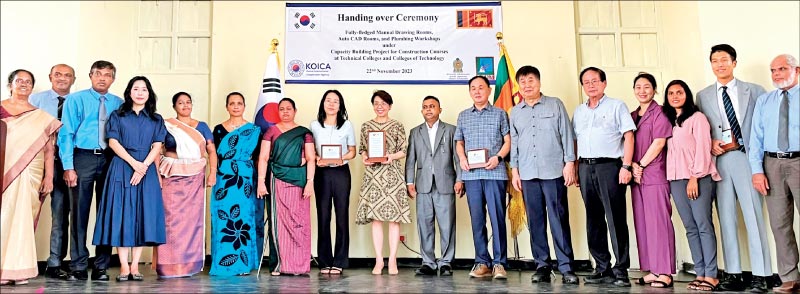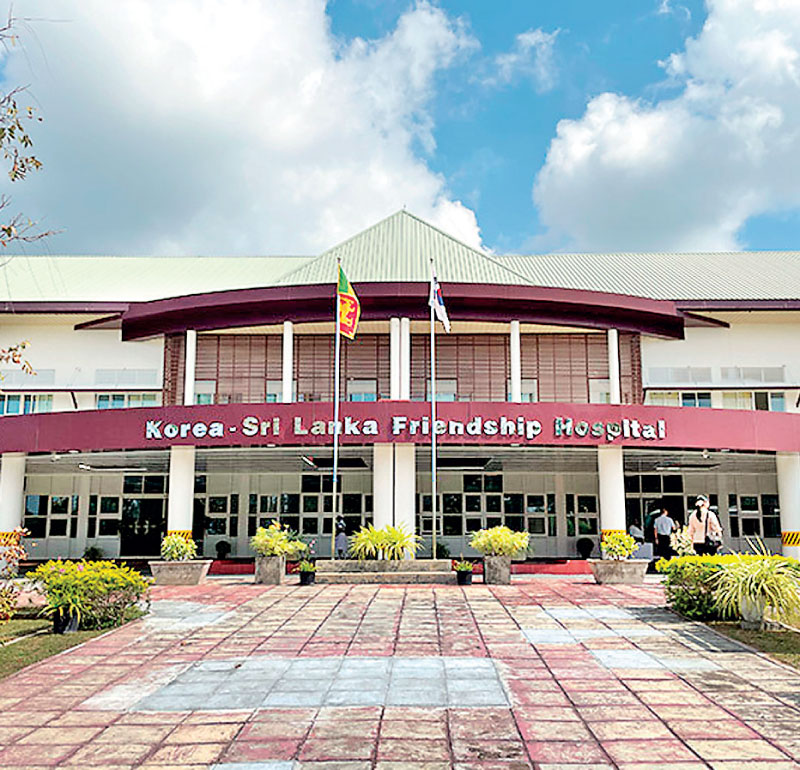Tuesday Feb 24, 2026
Tuesday Feb 24, 2026
Thursday, 23 November 2023 00:00 - - {{hitsCtrl.values.hits}}
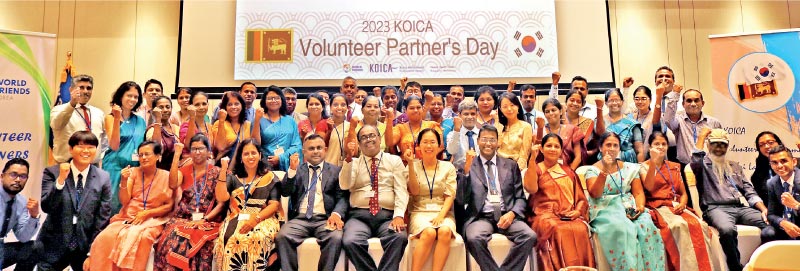
In a significant stride towards enhancing vocational education in Sri Lanka, the Korea International Cooperation Agency (KOICA) has allocated a grant of 4 million USD to the Ministry of Education and Department of Technical Education and Training. This funding is designated for the implementation to the Capacity Building Project for Construction Courses Project initiated in 2021.
Under this groundbreaking project, selected Technical Colleges (Matara and Ratmalana) and Colleges of Technology (Maradana and Ratnapura) have been equipped with fully-fledged Manual Drawing Rooms, AutoCAD Rooms, and Plumbing Workshops. Renovations have been undertaken to upgrade existing classrooms and workshops, complemented by the provision of 512 items of furniture and 1,328 of equipment and tools worth 1.8 million USD.
The symbolic handover ceremony took place on the 22nd of November 2023, at the Ratmalana Technical College premises. The event was graced by the esteemed presence of Her Excellency Miyon LEE, the Ambassador of the Republic of Korea to Sri Lanka, Ms. Muditha Malkanthi, Additional Secretary to the Ministry of Education, Ms. MyungJin Kim, Country Director of KOICA, Mr. S.C. Jagath, Director General of the Department of Technical Education and Training, and other dignitaries representing the Ministry of Education, KOICA Sri Lanka Office, DTET and beneficiary Colleges under the project.
During the ceremony, the additional secretary extended her deep appreciation to KOICA for its continued support in developing the TVET sector in Sri Lanka. She further stated “The world is moving forward rapidly with new technology. The TVET education in Sri Lanka needs to be developed in parallel to cater the global demands in the job market. The Korean Government through KOICA has provided their generous assistance over the past many years in the Sector of Technical Education in Sri Lanka. This project is one of the initiations to develop the infrastructure, capacities and curriculum of Construction Courses”.
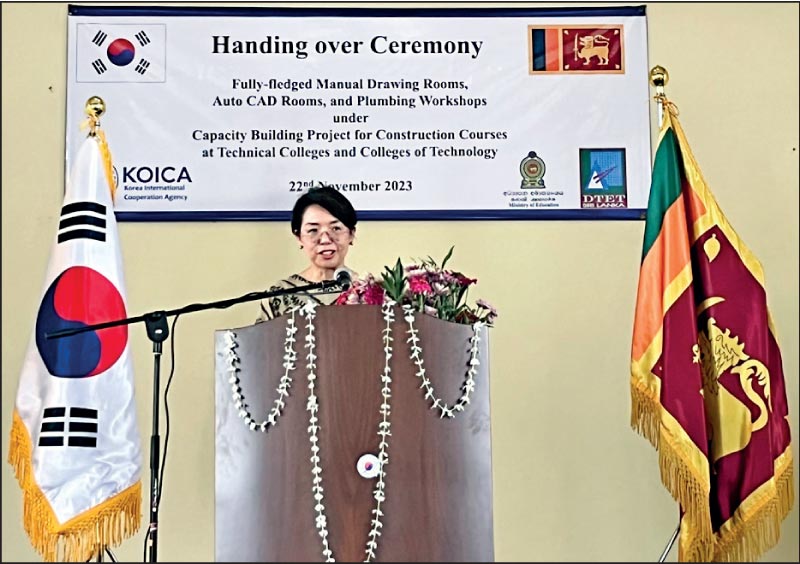
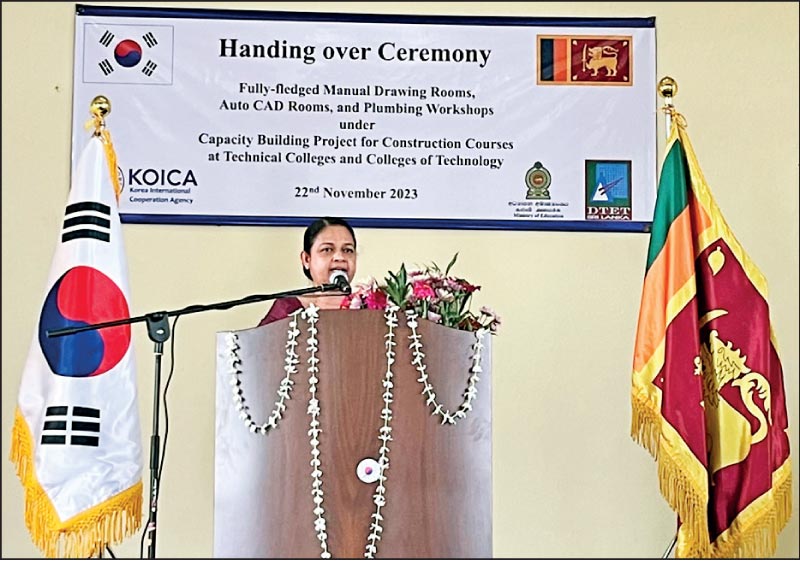
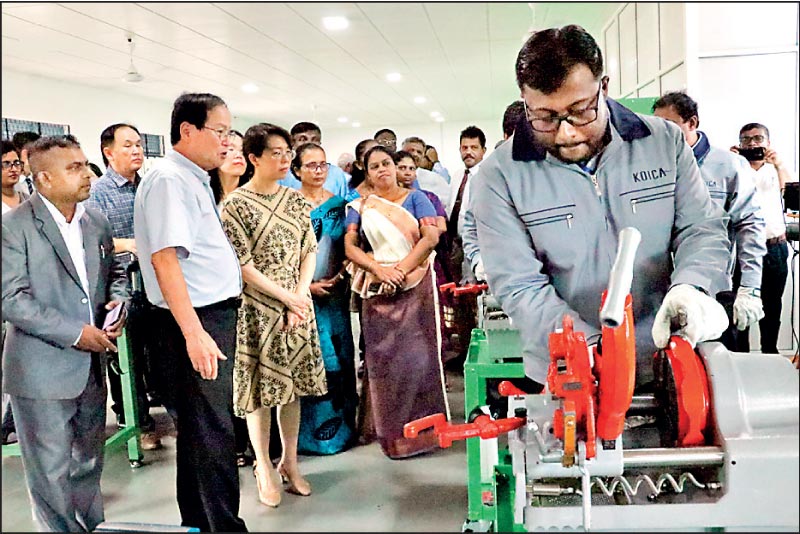
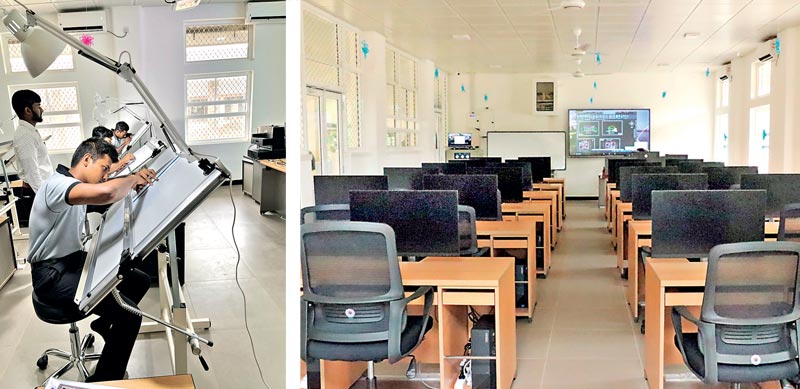
Addressing the gathering, Her Excellency Ambassador shared insights on the project, stating “This specific project aims to improve youth employment through high -quality Technical and Vocational Training and Education that meets the labor market demand in the construction sector”
The event was concluded with a comprehensive visit to the newly established facilities by the dignitaries.
Further to the infrastructure development, the project intends to provide capacity building for 20 trainers currently in service at the Colleges, enhancing their competencies in selected modules. In parallel, learning manuals for the trainers were developed by Experts from Korea. The project will also offer new on-the-job training (OJT) promotion strategies along with the joint involvement of the relevant authorities and commissions in Sri Lanka.
The overall consultation and management of the project will be led by a Project Management Consortium (PMC) team from the Bucheon University in Korea. This transformative initiative is expected to continue making strides until the end of the year 2024.
About KOICA

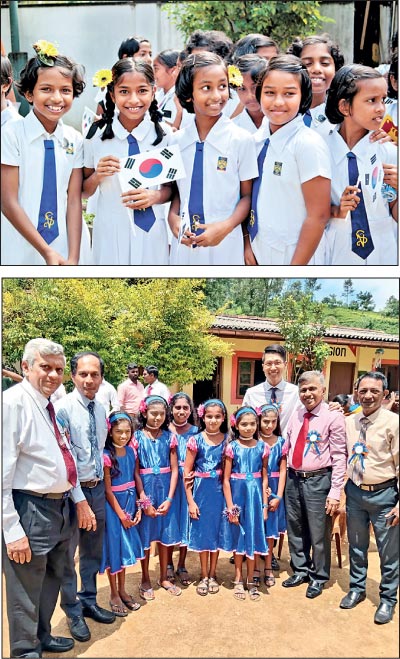 Established in 1991, the Korea International Cooperation Agency (KOICA) stands as the Korean government’s implementing agency for grant aid and technical cooperation. Rooted in the mission to contribute to sustainable socio-economic development, KOICA operates in 48 developing countries, aiming to end poverty and improve the quality of life.
Established in 1991, the Korea International Cooperation Agency (KOICA) stands as the Korean government’s implementing agency for grant aid and technical cooperation. Rooted in the mission to contribute to sustainable socio-economic development, KOICA operates in 48 developing countries, aiming to end poverty and improve the quality of life.
As the only donor country that made a dramatic transition from an ODA recipient country to donor country, The Republic of Korea is committed to share its distinctive development experience to bring hope to the people in need. KOICA inaugurated its office in Sri Lanka in 1995, focusing its support on projects and capacity building across four key sectors; Education, Transport, Water management & Sanitation, and Rural Development. Currently led by Country Director, MyungJin Kim, the Sri Lanka office plays a pivotal role in facilitating development cooperation.
Since its commissioning in 1995, KOICA Sri Lanka Office has been serving as a vital platform for development cooperation. The office actively implements various programs including Partnership with international development cooperation agencies, World friends Volunteers Programs, Capacity Building programs, Multilateral Cooperation, Public-Private Partnership, Emergency response in priority cooperation areas within key sectors. KOICA fosters diverse partnerships, collaborating with government and public organizations, civil society, the private sector, and academia, to enhance the effectiveness of development projects and to contribute to the achievement of SDGs.
As a leading development cooperation agency in Korea, KOICA remains dedicated to pursue global values and promotes mutual growth for the peace and prosperity of people worldwide.
visit www.koica.go.kr
World Expo 2030 BUSAN, KOREA
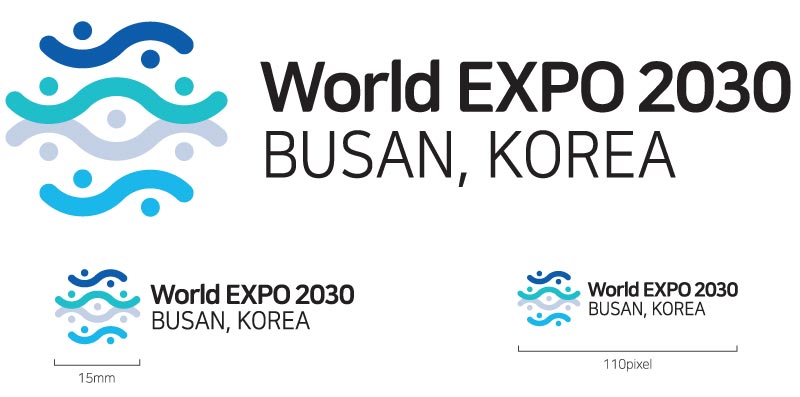
The Republic of Korea: A Symbol of Hope and Powerhouse of Culture and Technology from Aid Recipient to Global Contributor.
World Expos have consistently unveiled new visions for the potential of humanity. In the upcoming World Expo 2030, a collaborative platform will be established to address global challenges, fostering consensus between advanced and emerging economics. As a nation that has traversed the journey from developing to developed, the Republic of Korea stands as a bridge between these two worlds.
History bears witness to Korea’s remarkable ability to transform challenges into opportunities, emerging from crises stronger than ever. From a war-torn aid recipient to a donor and now a top-ten economic powerhouse, Korea serves as a symbol of hope, dedicated to advancing world peace harmony and inclusion.
World Expo 2030 will undoubtedly benefit from Korea’s rich history of resilience and innovation, making it a crucial forum for international cooperation and a testament to Korea’s commitment to shaping a better global future.
A front Runner in the 4th Industrial Revolution and Soft Power
As a world-leading global IT hub, Korea is at the forefront of the fourth industrial revolution with competitive technologies-AI, IOT, Big Data and Smart Mobility. Meanwhile the influence of K-Culture, K-pop and K-food has transcended borders, establishing a new global standard for soft power in culture, knowledge and thought.
Busan: Shaping the Future Humanity
Busan, a city rooted in diverse and dynamic culture derived from a fusion of different people and traditions, is uniquely positioned to design the future of mankind. It envisions a future characterized by mutual respect and harmony, engaging with the world on a global scale. With a history dating back 1,500-2,000 years to the ancient Gaya and Shilla periods, Busan played crucial role in trade and cultural exchange, laying the foundation for Korea’s economic development and the growth of global Korean companies following the Korean War.
Geographically situated at the crossroads of Eurasia and the Pacific Ocean, Busan offers optimal accessibility form anywhere. Renewed as a cultural hub, it hosts major events such as the Busan International Film Festival and G-STAR, making it a must-visit destination for food enthusiasts and tourist alike.
Under the theme “Transforming Our World, Navigating Toward a Better Future,” Korea’s bid to host the 2030 World Expo represents a platform to shift paradigms and reshare values. As the epicenter of Korea’s transformation, Busan is poised to chart a new course toward a brighter tomorrow for humanity and the Earth.
